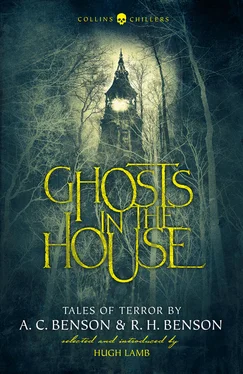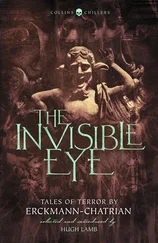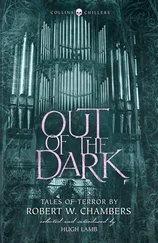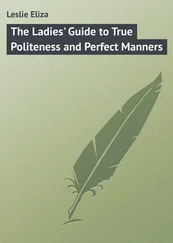‘In my first summer after I was called to the Bar I went down South Wales for a holiday with another man who had been with me at Oxford. His name was Murphy: he is a J.P. now, in Ireland, I think. I cannot think why we went to South Wales; but there it is: we did.
‘We took the train to Cardiff; sent on our luggage up the Taff Valley to an inn of which I cannot remember the name; but it was close to where Lord Bute has a vineyard. Then we walked up to Llandaff, saw St Tylo’s tomb; and went on again to this village.
‘Next morning we thought we would look about us before going on; and we went out for a stroll. It was one of the most glorious mornings I ever remember, quite cloudless and very hot; and we went up through woods to get a breeze at the top of the hill.
‘We found that the whole place was full of iron mines, disused now, as the iron is richer further up the country; but I can tell you that they enormously improved the interest of the place. We found shaft after shaft, some protected and some not, but mostly overgrown with bushes, so we had to walk carefully. We had passed half-a-dozen, I should think, before the thought of going down one of them occurred to Murphy.
‘Well, we got down one at last; though I rather wished for a rope once or twice; and I think it was one of the most extraordinary sights I have ever seen. You know perhaps what the cave of a demon-king is like, in the first act of a pantomime. Well, it was like that. There was a kind of blue light that poured down the shafts, refracted from surface to surface; so that the sky was invisible. On all sides passages ran into total darkness; huge reddish rocks stood out fantastically everywhere in the pale light; there was a sound of water falling into a pool from a great height and presently, striking matches as we went, we came upon a couple of lakes of marvellously clear blue water through which we could see the heads of ladders emerging from other black holes of unknown depth below.
‘We found our way out after a while into what appeared to be the central hall of the mine. Here we saw plain daylight again, for there was an immense round opening at the top, from the edges of which curved away the sides of the shaft, forming a huge circular chamber.
‘Imagine the Albert Hall roofless; or better still, imagine Saint Peter’s with the top half of the dome removed. Of course it was far smaller; but it gave an impression of great size; and it could not have been less than two hundred feet from the edge, over which we saw the trees against the sky, to the tumbled dusty rocky floor where we stood.
‘I can only describe it as being like a great, burnt-out hell in the Inferno . Red dust lay everywhere, escape seemed impossible; and vast crags and galleries, with the mouths of passages showing high up, marked by iron bars and chains, jutted out here and there.
‘We amused ourselves here for some time, by climbing up the sides, calling to one another, for the whole place was full of echoes, rolling down stones from some of the upper ledges: but I nearly ended my days there.
‘I was standing on a path, about seventy feet up, leaning against the wall. It was a path along which feet must have gone a thousand times when the mine was in working order; and I was watching Murphy who was just emerging on to a platform opposite me, on the other side of the gulf.
‘I put my hand behind me to steady myself; and the next instant very nearly fell forward over the edge at the violent shock to my nerves given by a wood-pigeon who burst out of a hole, brushing my hand as he passed. I gripped on, however, and watched the bird soar out across space, and then up and out at the opening; and then I became aware that my knees were beginning to shake. So I stumbled along, and threw myself down on the little platform on to which the passage led.
‘I suppose I had been more startled than I knew; for I tripped as I went forward; and knocked my knee rather sharply on a stone. I felt for an instant quite sick with the pain on the top of jangling nerves; and lay there saying what I am afraid I ought not to have said.
‘Then Murphy came up when I called; and we made our way together through one of the sloping shafts; and came out on to the hillside among the trees.’
Mr Percival paused; his lips twitched a moment with amusement.
‘I am afraid I must recall my promise,’ he said. ‘I told you all this because I was anxious to give a reason for the feeling I had about the mine, and which I am bound to mention. I felt I never wanted to see the place again – yet in spite of what followed, I do not necessarily attribute my feelings to anything but the shock and the pain that I had had. You understand that?’
His bright eyes ran round our faces.
‘Yes, yes,’ said Monsignor sharply, ‘go on please, Mr Percival.’
‘Well then!’
The lawyer uncrossed his legs and replaced them the other way.
‘During lunch we told the landlady where we had been; and she begged us not to go there again. I told her that she might rest easy: my knee was beginning to swell. It was a wretched beginning to a walking tour.
‘It was not that, she said; but there had been a bad accident there. Four men had been killed there twenty years before by a fall of rock. That had been the last straw on the top of ill-success; and the mine had been abandoned.
‘We inquired as to the details; and it seemed that the accident had taken place in the central chamber locally called “The Cathedral”; and after a few more questions I understood.
‘“That was where you were, my friend,” I said to Murphy, “it was where you were when the bird flew out.”
‘He agreed with me; and presently when the woman was gone announced that he was going to the mine again to see the place. Well; I had no business to keep him dangling about. I couldn’t walk anywhere myself: so I advised him not to go on to that platform again; and presently he took a couple of candles from the sticks and went off. He promised to be back by four o’clock; and I settled down rather drearily to a pipe and some old magazines.
‘Naturally I fell sound asleep; it was a hot, drowsy afternoon and the magazines were dull. I awoke once or twice, and then slept again deeply.
‘I was awakened by the woman coming in to ask whether I would have tea; it was already five o’clock. I told her Yes. I was not in the least anxious about Murphy; he was a good climber, and therefore neither a coward nor a fool.
‘As tea came in I looked out of the window again, and saw him walking up to the path, covered with iron-dust, and a moment later I heard his step in the passage; and he came in.
‘Mrs What’s-her-name had gone out.
‘“Have you had a good time?” I asked.
‘He looked at me very oddly; and paused before he answered.
‘“Oh, yes,” he said; and put his cap and stick in a corner.
‘I knew Murphy.
‘“Well, why not?” I asked him, beginning to pour out tea.
‘He looked round at the door; then he sat down without noticing the cup I pushed across to him.
‘“My dear fellow,” he said. “I think I am going mad.”
‘Well; I forget what I said: but I understood that he was very much upset about something; and I suppose I said the proper kind of thing about his not being a qualified fool.
‘Then he told me his story.’
Mr Percival looked round at us again, still with that slight twitching of the lips that seemed to signify amusement.
‘Please remember—’ he began; and then broke off. ‘No – I won’t—
‘Well.
‘He had gone down the same shaft that we went down in the morning; and had spent a couple of hours exploring the passages. He had found an engine-room with tanks and rotten beams in it, and rusty chains. He had found some more lakes too, full of that extraordinary electric-blue water; he had disturbed a quantity of bats somewhere else. Then he had come out again into the central hall; and on looking at his watch had found it after four o’clock; so he thought he would climb up by the way we had come in the morning and go straight home.
Читать дальше












